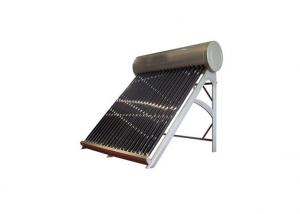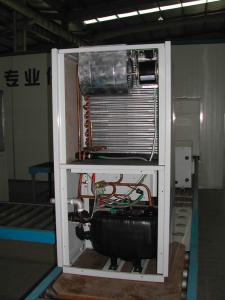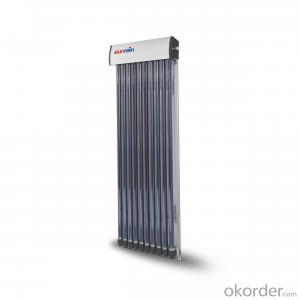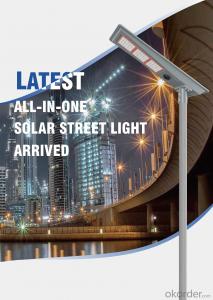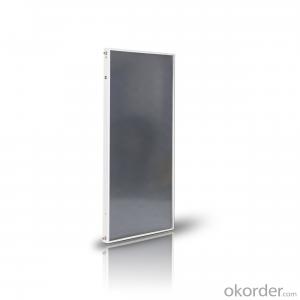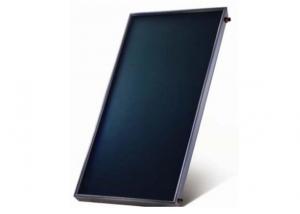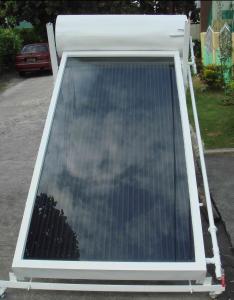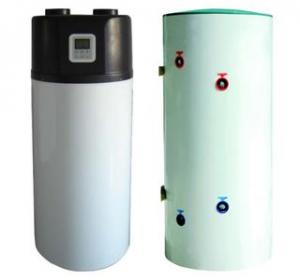2012 New Solar Hot Water Heater in Home Appliances
- Loading Port:
- China Main Port
- Payment Terms:
- TT or LC
- Min Order Qty:
- 1 Set set
- Supply Capability:
- 3000 Sets per Month set/month
OKorder Service Pledge
OKorder Financial Service
You Might Also Like
*ISO9001,ISO14001,RoHS,CCC,CE
*15 years life at least
Vacuum tubes use highborosilicate glass double-tube co-axial and adapt optical interfernece gradual change of SS-C/CU coating tevhnology. (STRUCTURE: Glass/CU/SS-ALN(H)/SS-ALN(L)/ALN). Through the interlayer, vacuum has an unique effect of thermo, with its temperature up to 400 degree of idle sunning, performing a strong heating abilitty.
| Material |
Outer tank:
PVDF / Colored galvanized steel plate / SUS 304-2B stainless steel / Wiredrawing plate |
Inner tank:
SUS304-2B stainless steel with CNC processing and Aotomatic argon-arc welding | |
Insulation:
50/55mm PUF with one-time filling&shaping technology to the density of 35~40kg/m3 | |
Frame:
Colored galvanized steel plate / Aluminium alloy / SUS 304-2B stainless steel |
| Features | Higher efficiency |
| Simple configuration | |
| Silicon rings to connect and seal them | |
| Automatic controllers can be applied to these systems or with an assist tank | |
| Electrical heating element | Mg bar is optional |
- Q:What is the expected performance of a solar water heater in different seasons?
- The expected performance of a solar water heater can vary depending on the season. During the summer months, when there is more sunlight and longer days, the solar water heater is likely to perform at its peak efficiency, providing ample hot water. In contrast, during the winter months, when there is less sunlight and shorter days, the performance of the solar water heater may decrease due to reduced solar energy availability. However, modern solar water heaters are designed to still generate hot water, albeit at a lower rate, even in colder seasons. Overall, the expected performance of a solar water heater in different seasons can be influenced by factors such as sunlight intensity, duration of daylight hours, and temperature variations.
- Q:Can a solar water heater be used in a mobile home or RV?
- Yes, a solar water heater can be used in a mobile home or RV. It can provide a sustainable and cost-effective way to heat water using solar energy, reducing the need for propane or electricity. However, it is important to ensure that the solar water heater is properly installed and compatible with the mobile home or RV's plumbing system.
- Q:Solar water heater can produce a lot of hot water a day
- Solar water heater is a photothermal converter, different from the traditional natural use, such as drying, lighting.The vacuum tube is the core of the solar water heater, his structure is like an elongated thermos bottle container, vacuum between the inner and outer layers. The surface of the inner glass tube is coated with a selective absorption coating by a special process to absorb the solar radiation energy
- Q:What is the average payback period for a solar water heater?
- The average payback period for a solar water heater typically ranges from 4 to 8 years, depending on various factors such as installation costs, energy savings, and local incentives.
- Q:How does a solar water heater affect water heater reliability?
- A solar water heater can positively impact water heater reliability by reducing the strain on the traditional water heater. The solar water heater uses renewable energy from the sun to preheat the water, which means the conventional heater does not have to work as hard or as frequently. This reduced workload can extend the lifespan of the water heater and decrease the chances of malfunctions or breakdowns.
- Q:Can a solar water heater be used in areas with limited access to reliable weather forecasting or solar radiation data?
- Yes, a solar water heater can still be used in areas with limited access to reliable weather forecasting or solar radiation data. While having access to accurate weather forecasting and solar radiation data can help optimize the performance of a solar water heater, it is not a requirement for its basic functionality. Solar water heaters can still effectively use available sunlight to heat water even without precise data. The design and sizing of the system can be based on general solar radiation estimates for the region, and adjustments can be made based on observations and experience over time. Additionally, solar water heaters often have backup heating systems, such as electric or gas heaters, which can be used during periods of low solar radiation or inclement weather.
- Q:How does the payback period of a solar water heater compare to a traditional water heating system?
- The payback period of a solar water heater is generally longer than that of a traditional water heating system. While the upfront costs of installing a solar water heater may be higher, the long-term savings on energy bills can offset this initial investment. Additionally, solar water heaters have a longer lifespan and require less maintenance, resulting in further cost savings over time.
- Q:How does the orientation of the solar panels affect the efficiency of a solar water heater?
- The efficiency of a solar water heater greatly depends on the orientation of the solar panels. The most efficient orientation varies based on the location of the solar water heater and the latitude. Typically, solar panels should be tilted at an angle that allows for maximum sunlight exposure throughout the day. For instance, in the Northern Hemisphere, solar panels should face south to capture the most sunlight as the sun moves from east to west. Conversely, in the Southern Hemisphere, solar panels should face north. The angle of the solar panels is also crucial. A solar water heater located closer to the equator would benefit from a steeper tilt angle, while locations farther from the equator would require a shallower tilt angle. This adjustment ensures that the solar panels are optimally positioned to receive sunlight at all times of the year. Properly orienting the solar panels enables them to capture more sunlight, resulting in increased efficiency. This is because the panels directly convert sunlight into usable energy, which is then utilized to heat the water. The more sunlight captured, the more energy is produced, leading to better efficiency for the solar water heater. However, it is important to consider that the orientation of solar panels is not the only factor influencing the efficiency of a solar water heater. Other factors, such as panel quality, heat transfer system efficiency, and water storage tank insulation, also contribute to the overall efficiency of the system. Therefore, while panel orientation is crucial, it should be considered alongside other design and operational factors to maximize the efficiency of a solar water heater.
- Q:How does a solar water heater impact water conservation efforts?
- A solar water heater can significantly impact water conservation efforts by reducing the amount of electricity or gas required to heat water, which in turn reduces the demand for these energy sources, ultimately leading to less water consumption in power generation processes. Additionally, solar water heaters can directly save water by utilizing sunlight to heat water instead of relying on traditional methods such as electric or gas-powered heaters, thereby conserving water resources.
- Q:Are there any limitations on the placement of a solar water heater on a building?
- Yes, there are some limitations on the placement of a solar water heater on a building. The primary limitation is the availability of direct sunlight. Solar water heaters need to be installed in a location that receives ample sunlight throughout the day, preferably facing south. Additionally, there should be enough space on the roof or ground for the solar panels and water storage tank. Local building codes and regulations may also have specific requirements or restrictions on the placement of solar water heaters.
1. Manufacturer Overview |
|
|---|---|
| Location | Zhejiang,China (Mainland) |
| Year Established | 2004 |
| Annual Output Value | US$10 Million - US$50 Million |
| Main Markets | North America; South America; Southeast Asia; Africa; Oceania; Mid East; Western Europe |
| Company Certifications | ISO 9001:2000 |
2. Manufacturer Certificates |
|
|---|---|
| a) Certification Name | |
| Range | |
| Reference | |
| Validity Period | |
3. Manufacturer Capability |
|
|---|---|
| a)Trade Capacity | |
| Nearest Port | |
| Export Percentage | 61% - 70% |
| No.of Employees in Trade Department | |
| Language Spoken: | |
| b)Factory Information | |
| Factory Size: | 5,000-10,000 square meters |
| No. of Production Lines | 8 |
| Contract Manufacturing | OEM Service Offered |
| Product Price Range | |
Send your message to us
2012 New Solar Hot Water Heater in Home Appliances
- Loading Port:
- China Main Port
- Payment Terms:
- TT or LC
- Min Order Qty:
- 1 Set set
- Supply Capability:
- 3000 Sets per Month set/month
OKorder Service Pledge
OKorder Financial Service
Similar products
New products
Hot products
Hot Searches
Related keywords
